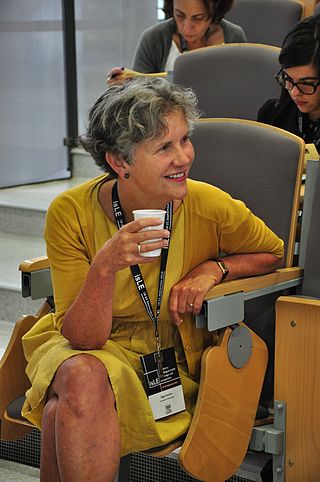Related Research Articles

In linguistics, syntax is the study of how words and morphemes combine to form larger units such as phrases and sentences. Central concerns of syntax include word order, grammatical relations, hierarchical sentence structure (constituency), agreement, the nature of crosslinguistic variation, and the relationship between form and meaning (semantics). There are numerous approaches to syntax that differ in their central assumptions and goals.
An idiom is a phrase or expression that usually presents a figurative, non-literal meaning attached to the phrase. Some phrases which become figurative idioms, however, do retain the phrase's literal meaning. Categorized as formulaic language, an idiom's figurative meaning is different from the literal meaning. Idioms occur frequently in all languages; in English alone there are an estimated twenty-five million idiomatic expressions.
A dummy pronoun is a deictic pronoun that fulfills a syntactical requirement without providing a contextually explicit meaning of its referent. As such, it is an example of exophora.
In linguistics, valency or valence is the number and type of arguments controlled by a predicate, content verbs being typical predicates. Valency is related, though not identical, to subcategorization and transitivity, which count only object arguments – valency counts all arguments, including the subject. The linguistic meaning of valency derives from the definition of valency in chemistry. Like valency found in chemistry, there is the binding of specific elements. In the grammatical theory of valency, the verbs organize sentences by binding the specific elements. Examples of elements that would be bound would be the complement and the actant. Although the term originates from valence in chemistry, linguistic valency has a close analogy in mathematics under the term arity.
Topicalization is a mechanism of syntax that establishes an expression as the sentence or clause topic by having it appear at the front of the sentence or clause. This involves a phrasal movement of determiners, prepositions, and verbs to sentence-initial position. Topicalization often results in a discontinuity and is thus one of a number of established discontinuity types, the other three being wh-fronting, scrambling, and extraposition. Topicalization is also used as a constituency test; an expression that can be topicalized is deemed a constituent. The topicalization of arguments in English is rare, whereas circumstantial adjuncts are often topicalized. Most languages allow topicalization, and in some languages, topicalization occurs much more frequently and/or in a much less marked manner than in English. Topicalization in English has also received attention in the pragmatics literature.

Laura A. Michaelis is a Professor in the Department of Linguistics and a faculty fellow in the Institute of Cognitive Science at the University of Colorado Boulder.
In certain theories of linguistics, thematic relations, also known as semantic roles, are the various roles that a noun phrase may play with respect to the action or state described by a governing verb, commonly the sentence's main verb. For example, in the sentence "Susan ate an apple", Susan is the doer of the eating, so she is an agent; an apple is the item that is eaten, so it is a patient.
Sociohistorical linguistics, or historical sociolinguistics, is the study of the relationship between language and society in its historical dimension. A typical question in this field would, for instance, be: "How were the verb endings -s and -th distributed in Middle English society" or "When did people use French, when did they use English in 14th-century England?"

Niina Ning Zhang is a theoretical linguist specializing in Mandarin Chinese syntax and semantics.
Jeroen van de Weijer is a Dutch linguist who teaches phonology, morphology, phonetics, psycholinguistics, historical linguistics and other courses at Shenzhen University, where he is Distinguished Professor of English linguistics at the School of Foreign Languages. Before, he was Full Professor of English Linguistics at Shanghai International Studies University, in the School of English Studies.

Willem Johannes Maria (Pim) Levelt is a Dutch psycholinguist. He is a researcher of human language acquisition and speech production. He developed a comprehensive theory of the cognitive processes involved in the act of speaking, including the significance of the "mental lexicon". Levelt was the founding director of the Max Planck Institute for Psycholinguistics in Nijmegen. He also served as president of the Royal Netherlands Academy of Arts and Sciences between 2002 and 2005, of which he has been a member since 1978.

Pieter Albertus Maria Seuren was a Dutch linguist, emeritus professor of Linguistics and Philosophy of Language at the Radboud University, Nijmegen, and research fellow at the Max Planck Institute for Psycholinguistics at Nijmegen.
Suzanne Romaine is an American linguist known for work on historical linguistics and sociolinguistics. From 1984 to 2014 she was Merton Professor of English language at the University of Oxford.

Ellen José van Wolde is a Dutch biblical scholar. In her research she focuses mainly on the Hebrew Bible, applying achievements of semiotics and linguistics. She became known to the general public mainly through her oration (2009) on the first three sentences of the book of Genesis. Since the summer of 2021 she is Emeritus Professor at the Radboud University Nijmegen.
Nigel Vincent is a British linguist. He is Professor Emeritus of General and Romance Linguistics at the University of Manchester. He is best known for his work on morphology, syntax, and historical linguistics, with particular focus on the Romance languages.

Olga Fischer is a Dutch linguist and an expert on the English language. She is Professor Emerita of Germanic Linguistics at the University of Amsterdam and former president of the International Society for the Linguistics of English.
Elena Anagnostopoulou is a Greek theoretical linguist and syntactician. She is currently Professor of Theoretical Linguistics at the University of Crete.
Bettelou Los is a linguist and philologist specializing in the history of the English language. Since 2013 she has held the Forbes Chair of English Language at the University of Edinburgh.
Asifa Majid is a psychologist, linguist and cognitive scientist who is professor of language, communication and cultural cognition at the University of Oxford, UK.
Mirjam Ernestus is professor of psycholinguistics and scientific director of the Centre for Language Studies at Radboud University Nijmegen in the Netherlands.
References
- 1 2 "Prof. A.M.C. van Kemenade" . Retrieved 19 September 2021.
- 1 2 "Academia Europaea: Ans van Kemenade" . Retrieved 19 September 2021.
- ↑ "Academia Europaea: Ans van Kemenade CV" . Retrieved 19 September 2021.
- ↑ John Benjamins: Word Order Change in Acquisition and Language Contact. John Benjamins Publishing Company. 16 January 2024. ISBN 978-90-272-5726-0 . Retrieved 19 September 2021.
- ↑ "Royal honours for seven Radboud professors" . Retrieved 19 September 2021.
- ↑ "Ans van Kemenade". scholar.google.nl. Retrieved 31 August 2022.